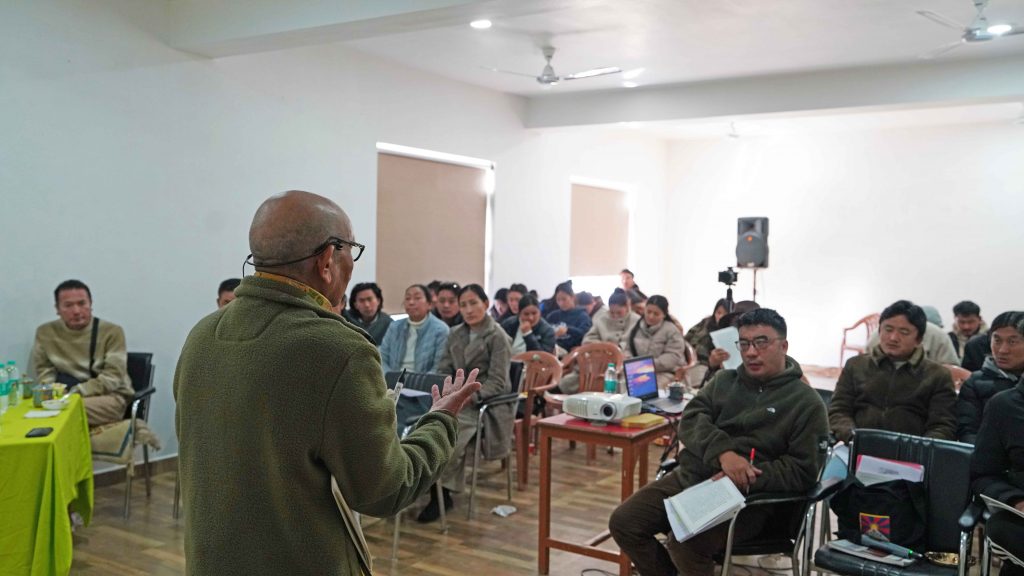༄༅། །ཕྱི་ལོ་ ༢༠༢༥ ཟླ་ ༡ ཚེས་ ༢༧ ནས་ ༣༡ བར་ཉིན་གྲངས་ལྔའི་རིང་མཁས་དབང་དར་ཞབས་འཇམ་དཔལ་སྐལ་ལྡན་ལགས་དང་ཁོང་གི་སྲས་དར་ཞབས་འཇིགས་མེད་དབང་ཕྱུག་ལགས་རྣམ་གཉིས་བོད་ཀྱི་ཟློས་གར་ཚོགས་པར་གདན་ཞུས་ཀྱིས་ས་སྐྱ་པཎྜི་ཏ་ཆེན་པོས་མཛད་པའི་རོལ་མོའི་བསྟན་བཅོས་དང་མཁས་དབང་རང་ཉིད་ཀྱིས་མཛད་པའི་རོལ་མོའི་བསྟན་བཅོས་དྲི་ཟའི་གླུ་དབྱངས་གཉིས་ཉིན་འཁྱོངས་སློབ་ཁྲིད་མཛད། གཞི་རྩའི་འདི་ག་བོད་ཀྱི་ཟློས་གར་ཚོགས་པའི་སྤྱི་ཁྱབ་ཡིག་ཚང་ནས་ཕྱག་བྲིས་སྔ་ཕྱི་རིམ་པ་འབུལ་བཞེས་ཀྱིས་ཕྱི་ཟླ་དགུ་པ་པའི་ནང་གདན་ཞུ་གནང་འཆར་ཡོད་ཀྱང་། མཁས་དབང་མཆོག་ན་ཚོད་བབ་ཀྱི་སྐུ་གཟུགས་འཕྲོད་བཞེས་མི་བདེ་བའི་དབང་གིས་ཆེད་ཕེབས་གནང་མི་ཐུབ་པར་སོང་། ཟླ་ ༡༢ པའི་ནང་ཞུ་བསྐུལ་སྐྱབས་འཇུག་བསྐྱར་ཞུས་ཀྱིས་ད་ལན་ཆེད་ཕེབས་གནང་ཐུབ་པ་བྱུང་།

ད་ལན་བོད་ཀྱི་རོལ་མོའི་བསྟན་བཅོས་ཟབ་སྦྱོང་ནང་དགེ་རྒན་དང་སློབ་ཕྲུག་གཙོས་གྲངས་ལྔ་བཅུ་ལྷག་ལ་ཞོགས་པ་ཚོུད་ ༩།༠༠-ཕྱི་དྲོ། ཚོུད་ ༣།༠༠ བར་ས་སྐྱ་པཎྜི་ཏའི་མཛད་པའི་རོལ་མོའི་བསྟན་བཅོས་ཀྱི་དབྱངས་ཀྱི་ལེའུ་དང་ཚིག་གི་ལེའུ། སྦྱོར་བ་གཏན་ལ་དབབ་པའི་ལེའུ་གསུམ་འཆད་འཁྲིད་ལེགས་པར་གནང་བ་དང་། དེ་ལྷན་མཁས་དབང་རང་ཉིད་ཀྱིས་མཛད་པའི་རོལ་མོའི་བསྟན་བཅོས་དྲི་ཟའི་གླུ་དབྱངས་སློབ་ཁྲིད་མཛད་སྐལ་བྱུང་བཞིན། དགེ་རྒན་དང་སློབ་ཕྲུག་ཀུན་གྱིས་ཐུགས་སྣང་ཆེན་པོས་རོལ་དབྱངས་རིག་པའི་གཞུང་ལུགས་དང་དཀྲོལ་གཏོང་བྱེད་ཕྱོགས་སོགས་དང་འབྲེལ་བའི་དོགས་གནད་ཁག་ལ་ལན་འདེབས་རྒྱས་པར་མཛད་གནང་སོང་།
དེ་རིང་བོད་ཀྱི་ཟློས་གར་ཚོགས་པར་རོལ་མོའི་བསྟན་བཅོས་སློབ་ཁྲིད་མཛད་སྐལ་བྱུང་བ་ནི་འདས་པའི་མི་ལོ་དྲུག་ཅུའི་ནང་ཐེངས་དང་པོར་གྱུར་ཡོད་པ་དང་། མཁས་དབང་མཆོག་ནས་ཀྱང་མི་ལོ་ལྔ་བཅུ་ལྷག་གི་རིང་བོད་ཀྱི་རོལ་མོའི་བསྟན་བཅོས་ཐོག་ཞིབ་འཇུག་ཞིབ་གནད་བགྱིས་ཏེ་འཐུས་སྒོ་མ་ཚང་བའི་རིགས་ཁ་སྣོན་མཛད་གནང་ཡོད། དེ་བཞིན་ནུབ་ཕྱོགས་དང་རྒྱ་གར་གྱི་རོལ་དབྱངས་རིག་པའི་གཞུང་ལུགས་ཁག་ལ་ཞིབ་བསྡུར་ལེགས་པར་གནས་སྟེ། བོད་ཀྱི་རོལ་མོའི་གཞུང་ལུགས་ཀྱི་དབྱངས་རྟ་དང་དཀྲོལ་གཏོང་རིག་པ་སོགས་ཞིབ་འཇུག་མཐིལ་ཕྱིན་གནང་ནས་ཁོང་རང་ཉིད་ནས་རོལ་མོའི་བསྟན་བཅོས་དྲི་ཟའི་གླུ་དབྱངས་གསར་རྩོམ་མཛད་ནས། བོད་ཀྱི་རོལ་མོའི་གཞུང་ལུགས་ལ་སློབ་སྦྱོང་གནང་མཁན་ཚོར་མིག་སྨན་མིག་ཐོགས་ཡོང་རྒྱུར་དམིགས་ཡོད་པར་སོང་། ད་ལན་གྱི་ཟབ་སྦྱོང་འདི་བརྒྱུད་སླད་མར་བོད་ཀྱི་ཟློས་གར་ཚོགས་པའི་སྒྱུ་རྩལ་པ་རྣམས་ཀྱི་བོད་ཀྱི་རོལ་དབྱངས་རིག་པའི་གཞུང་ལུགས་དང་ལག་ལེན་ཟུང་སྦྲེལ་བགྱིས་ཏེ་སྤྱི་ཚོགས་ལ་སྨིན་པའི་བྱ་བ་མཛད་རྒྱུར་ཕན་ཐོགས་རླབས་ཆེན་བྱུང།


TIPA conducts a five-day musical workshop: preserving and advancing Tibetan Musical Theory
From January 27-31, 2025, the Tibetan Institute of Performing Arts (TIPA) hosted a five-day intensive workshop on classical Tibetan musical theory. The workshop was led by renowned scholar Darshab Jampal Kalden and his son Dharshab Jigme Wangchuk, who provided in-depth instruction on two significant musical treatises: the classical work by Sakya Pandita and Jampal Kalden’s own composition, “Melody of the Gandharvas.”
The path to organizing this workshop required patience and flexibility. While TIPA initially extended an invitation for September 2024 through official channels, the scholar’s age-related health concerns necessitated postponement. Following renewed discussions in December, arrangements were successfully made for the January session.


The workshop attracted 42 participants, comprising both faculty and students, who engaged in comprehensive daily sessions from 9:00 AM to 3:00 PM. The curriculum delved into Sakya Pandita’s three foundational chapters exploring melody, lyrics, and musical composition theory. Participants also studied “Melody of the Gandharvas,” benefiting from the scholar’s direct insights into his work. Throughout the sessions, the engaging discourse between instructors and participants fostered deep exploration of both theoretical concepts and practical performance techniques.

This workshop represents a watershed moment for TIPA, marking the first formal instruction on musical treatises at the institute in six decades. Dar Zhabs Jampal Kalden brings extraordinary expertise to this teaching, having dedicated over half a century to the study and preservation of Tibetan musical traditions. His scholarly contributions include completing fragmentary musical texts and conducting comparative analyses with Western and Indian musical theories. His comprehensive research into Tibetan musical scales and performance techniques culminated in “Melody of the Gandharvas,” which serves as an essential contemporary resource for students of Tibetan music.




The workshop’s impact extends beyond its immediate participants. By bridging theoretical knowledge with practical application, TIPA’s artists are now better equipped to preserve and advance Tibetan musical traditions, enriching their cultural contributions to society. This training strengthens TIPA’s role as a premier institution for the preservation and development of Tibetan performing arts.











